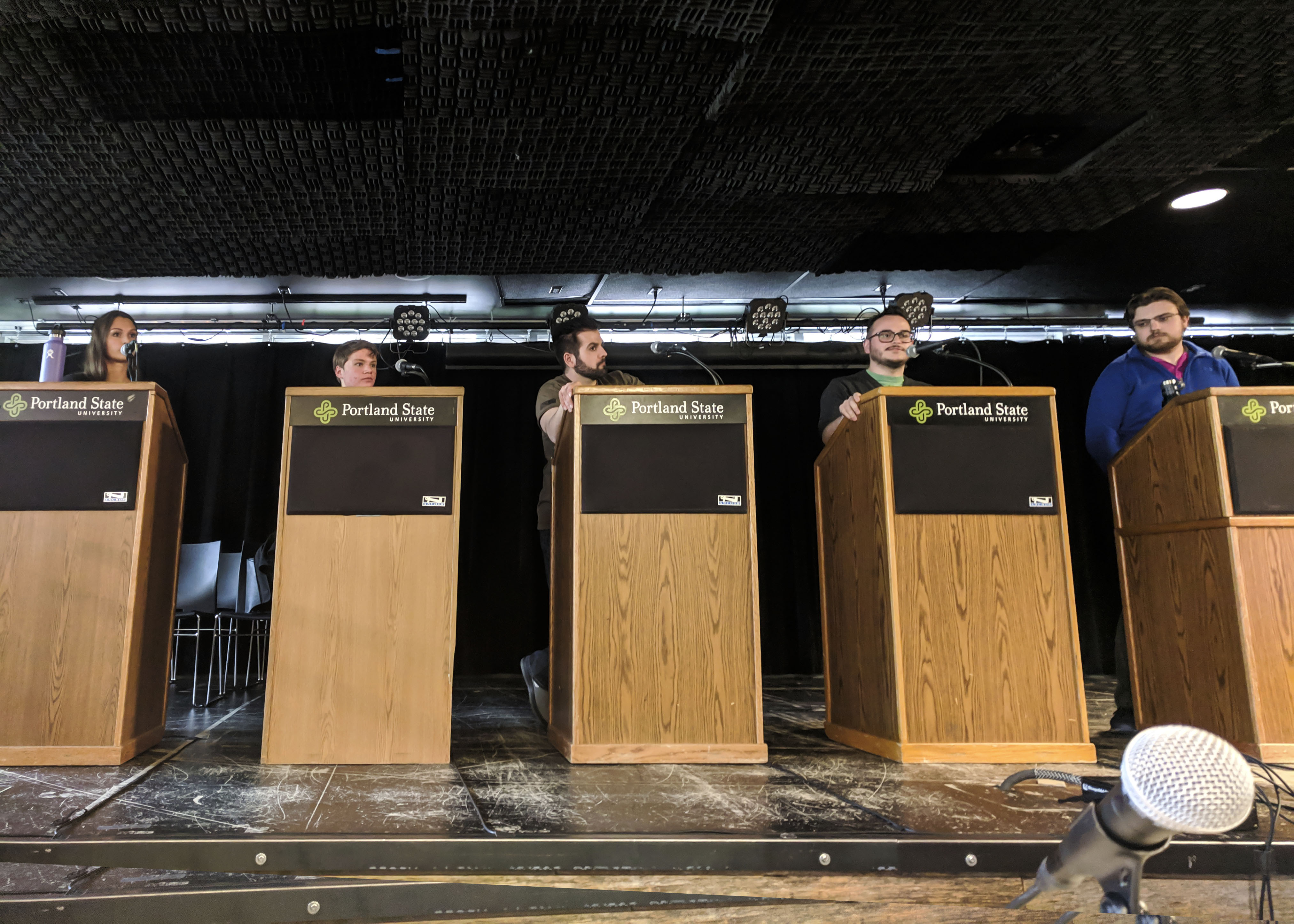Associated Students of Portland State University candidates for president and vice president met on April 8 in Parkway North for a debate focusing on topics of community engagement, administrator-student transparency and campus safety, as well as other issues facing students.
Presidential candidate Violet Gibson and vice-presidential candidate Neyali Aranjo-Robles under new possibilities true leadership slate are running against presidential candidate Kyle Leslie-Christy and vice-presidential candidate Motutama Sipelii under the creating cohesive community slate.
Student engagement
Both ASPSU presidential candidates expressed how student engagement is a priority.
“I believe that everyone, given the right opportunity, can and will be engaged,” Leslie-Christy said. “Building community at PSU is a foundational tool that we can use to tackle the issues that face us, like tuition reduction, housing insecurity, food insecurity, getting a living wage for students who work on campus and having better agency in our education.”
The main goal of the new possibilities true leadership slate, according to Gibson, is to give students a voice on campus, which provides a basis for improving the student body and overall campus community.
“Throughout the whole entire year we want to make sure we’re being a true liaison to the students,” Gibson said.
Campus safety and armament
Leslie-Christy and Gibson also discussed police armament and campus safety concerns, with both presidential candidates acknowledging the complexity of the situation. Leslie-Christy added that campus officers should be trained in confirmation bias and conflict resolution prior to being armed.
“With adequate education and facilitation of community building and community involvement by a security officer, they become less like security officers and more like community members,” Leslie-Christy said.
However, Leslie-Christy also said that for the most part, campus security should not be armed and that he doesn’t believe “individuals should ever hold that power within themselves.”
Gibson on the other hand is in support of police armament, citing a Margolis Healy report poll that 52% of the student body felt safer with armed campus police.
“I went around and I asked a few students to try to do my own poll, and I found out the majority of those students did prefer to have campus security be armed,” Gibson said. “Also, I had some personal conversations with CPSO…and what I’ve gotten from those conversations is that the main reason [CPSO] needs to have weapons is because Portland Police [is] already understaffed.”
Administrator-student transparency
Regarding transparency between administrators and students, Leslie-Christy talked about the importance of advocating for the student body and being as open as possible on issues concerning campus. He said that although administrators sometimes don’t want the student body to know certain issues in order to prevent “us from getting riled up,” he plans to communicate more with administrators.
“It’s important that we have someone who’s willing to ask the tough questions of the administration and then with those tough questions, get tough answers and then deliver those tough answers back to the student body and be as transparent as we possibly can be,” Leslie-Christy said.
Gibson also agrees there has been a challenging relationship between ASPSU and the administration in past years, but not out of malicious intent.
“We can increase transparency in the future by ensuring that we have a positive relationship with the administration and have those hard conversations,” Gibson said. “I think it’s a matter of us honestly rekindling that relationship and ensuring that students know what they’re paying for and what the administration’s true intentions are.”
When discussing what questions need to be asked of the administration, Aranjo-Robles responded with: “What is our money going toward?”
Sipelii also said that he plans to ask the administration their plans on fixing current issues facing the campus and student body, such as high tuition.
“ASPSU, with the support of the student body, we can take our stand toward the administration and we can make a difference,” he said.
Concerns facing students
When asked about issues facing PSU students, Aranjo-Robles cited tuition increases, campus safety and food insecurity as pressing concerns.
Aranjo-Robles noted the link between rising tuition costs and food insecurity and said she hopes to work more with the food pantry and help the community get more involved through volunteerships.
Sipelii agreed and added “[students] not being a part of a community” as another concern.
“I feel the best way to go about [addressing these issues] is to build community where we’re able to talk to each other and don’t judge each other,” Sipelii said.
Clarification:
Gibson said during the presidential, vice-presidential debate that “Vanguard published a poll from students…the outcome was that over 52% of students felt more comfortable with campus security armed.”
However, the published poll mentioned in the above quote is referring to coverage of the Margolis Healy report, which states that 52% of the 14% of students, faculty, staff and community members surveyed by Margolis Healy opposed armed officers on campus.
Vanguard news team moderated this debate.
I’m currently attending the MFA creative writing program with an emphasis in nonfiction at Portland State and hold a master’s in English with a concentration in book publishing. Managing content across different platforms, I incorporate creativity and honesty to connect and engage with our audience.







Yeah the Margolis Healy report said 52% of students staff and faculty DONT want armament, only 37% want it. Fact checking anyone?